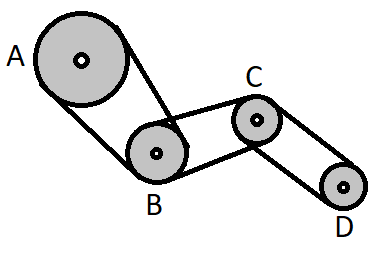Mechanical Comprehension Test
- Overview
- Curriculum
- Sample Question
- Reviews
If you are looking to apply for jobs related to mechanics, you are likely to encounter mechanical comprehension tests. Here’s all you need to know.
What is a Mechanical Comprehension Test?
Mechanical Comprehension Tests, also referred to as Mechanical Aptitude Tests, are psychometric tests intended to predict performance in a variety of industries requiring a level of mechanical knowledge such as engineering, machine operation, and manufacturing. Generally speaking, Mechanical Comprehension Tests require an individual to recognize which mechanical principle is suggested by a test item. These concepts can involve velocity, weight, sound, and speed, amongst other things.
Mechanical Aptitude Tests are widely used for the following purposes:
- Identification of candidates with strong spatial perception and mechanical reasoning ability.
- Assessment of a candidate’s functional knowledge of basic mechanical operations.
- Recognition of an aptitude for learning mechanical processes and tasks.
- Prediction of employee success and, subsequently, appropriate alignment of the workforce.
The major professions which Mechanical Aptitude Tests are relevant to include, but is not limited to:
- Automotive/Aircraft Mechanics
- Engineering
- Installation/Maintenance/Repair
- Industrial/Technical Sales
- Electronics
- Welding
- Carpentry
- Transportation Trades
- Equipment Operation
Prepterminal provides test preparation packs for a variety of mechanical comprehension tests. Our expert psychometricians have painstakingly constructed study courses and mock tests in order to ensure that you have everything you need to succeed in the assessment process and secure your dream job.

Mechanical Aptitude Course
Last Updated: Sep 13, 2024
Mechanical Aptitude Prep Course
Course Content
-
1MA Practice testsBuy this Course: Get full access to all lessons, practice tests and guides.
-
2MA Word ProblemsBuy this Course: Get full access to all lessons, practice tests and guides.
-
3MA Number SeriesBuy this Course: Get full access to all lessons, practice tests and guides.
-
4MA Lowest ValuesBuy this Course: Get full access to all lessons, practice tests and guides.
-
5AcousticsBuy this Course: Get full access to all lessons, practice tests and guides.
-
6Mechanical ConceptsBuy this Course: Get full access to all lessons, practice tests and guides.
-
7BuoyancyBuy this Course: Get full access to all lessons, practice tests and guides.
-
8OpticsBuy this Course: Get full access to all lessons, practice tests and guides.
-
9ThermodynamicsBuy this Course: Get full access to all lessons, practice tests and guides.
-
10MA Spatial AwarenessBuy this Course: Get full access to all lessons, practice tests and guides.
-
11Tools, Materials, and EquipmentBuy this Course: Get full access to all lessons, practice tests and guides.
-
12Electronics and PLCBuy this Course: Get full access to all lessons, practice tests and guides.
-
13Electrical Theory and Control CircuitsBuy this Course: Get full access to all lessons, practice tests and guides.
-
14Test InstrumentsBuy this Course: Get full access to all lessons, practice tests and guides.
-
15Pneumatics and HydraulicsBuy this Course: Get full access to all lessons, practice tests and guides.
-
16Power Transmission and Preventive MaintenanceBuy this Course: Get full access to all lessons, practice tests and guides.
-
17Maintenance Technician Test Final QuizzesBuy this Course: Get full access to all lessons, practice tests and guides.
-
18BONUS Interview Prep Video GuideBuy this Course: Get full access to all lessons, practice tests and guides.
-
19PressureBuy this Course: Get full access to all lessons, practice tests and guides.
-
20LeversBuy this Course: Get full access to all lessons, practice tests and guides.
-
21GearsBuy this Course: Get full access to all lessons, practice tests and guides.
-
22Wheels & BeltsBuy this Course: Get full access to all lessons, practice tests and guides.
-
23Pulley SystemsBuy this Course: Get full access to all lessons, practice tests and guides.
-
24SpringsBuy this Course: Get full access to all lessons, practice tests and guides.
-
25BallisticsBuy this Course: Get full access to all lessons, practice tests and guides.
-
26Circular MotionBuy this Course: Get full access to all lessons, practice tests and guides.
-
27Other Simple MachinesBuy this Course: Get full access to all lessons, practice tests and guides.
-
28MA Intro and StrategyBuy this Course: Get full access to all lessons, practice tests and guides.
-
29Gas PressureBuy this Course: Get full access to all lessons, practice tests and guides.
-
30Electrical CircuitsBuy this Course: Get full access to all lessons, practice tests and guides.
-
31Series & Parallel CircuitsBuy this Course: Get full access to all lessons, practice tests and guides.
-
32Electric PowerBuy this Course: Get full access to all lessons, practice tests and guides.
-
33MagnetismBuy this Course: Get full access to all lessons, practice tests and guides.
-
34MA Non-Verbal AnalogiesBuy this Course: Get full access to all lessons, practice tests and guides.
-
35MA Inductive ReasoningBuy this Course: Get full access to all lessons, practice tests and guides.
Types of Mechanical Comprehension Tests
There is a number of Mechanical Comprehension Tests on the market, used by a variety of employers in order to ascertain the mechanical aptitude of prospective employees:
Bennett Mechanical Comprehension Test-II
The second version of the Bennett Mechanical Comprehension Test, this is a tool for the assessment of a candidate’s ability to perceive and understand the relationship of physical forces and mechanical elements in practical situations. This test comprises of 55 questions with a time limit of 25 minutes. Questions are weighted based on difficulty, and so the raw score differs from calculated score and percentile ranking. It is quite usual for two candidates with identical raw scores to score completely differently in every other facet of the results report.
Wiesen Test of Mechanical Aptitude
The Wiesen Test of Mechanical Aptitude is a measure of a candidate’s ability to properly use machinery and maintain the equipment in the best working order. Designed as a predictor for job performance in specific occupations involving the operation and maintenance of tools, equipment, and machinery, this test comprises of 60 questions to be answered in 30 minutes.
US Department of Defence Test of Mechanical Aptitude
The US Department of Defence Test of Mechanical Aptitude is the mechanical comprehension subtest of the Armed Services Vocational Aptitude Battery (ASVAB). This test is used to identify the capability and academic ability of recruits in order to appropriately assign them the correct job. Generally speaking, the higher the score of a candidate, the more job opportunities they will have in the military. This mechanical aptitude test is one of ten subtests in the ASVAB.
Stenquist Test of Mechanical Aptitude
A slight variation from standard mechanical tests, in the Stenquist Test candidates are required to observe a set of pictures and determine which one fits in best with another group of pictures. This is delivered as a visual test in order to avoid any difference in scoring which is not related purely to mechanical aptitudes, such as reading and comprehension issues. This test comes in a variety of different versions depending on the field in which the candidate is pursuing a career within.
Mechanical Comprehension Test Questions
The questions found in mechanical comprehension tests tend to come with multiple choice answers, where only one solution is correct. Questions vary in difficulty depending on the test and present visual questions with some text to deliver the context & question (with the exception of the Stenquist Test, which is purely image-based).
Questions tend to cover straightforward mechanical and physical concepts, such as:
Levers
In common application, levels offer a mechanical advantage when carrying loads. It is comprised of a fulcrum and a rod/beam, with the load being applied on the beam. Results are contingent upon the distance between the arm and the force producing torque. Questions may cover differentiation between the level of torque between the input or output or the course of its tilt. It is common for these questions to require light calculation.
Pulleys
A pulley is a combination of a wheel placed on an axle with a rope wrapped around it, which can be used to more easily lift loads using a rope. A fixed pulley serves to change the direction of an applied force, while a movable pulley allows for the lifting a load with much less effort. A combination of the two types can provide directional and mechanical advantages. For the purpose of mechanical aptitude tests, pulleys are considered to be one-dimensional, and as such size and friction are not a consideration. Questions will often pertain to the volume of force required to lift a defined weight.
Gears
Gears are cylinders or wheels which have cogs or teeth on their edges for the purpose of transmitting spherical torque to another gear, turning said cogwheel in the opposite direction. In mechanical aptitude tests, it is common to be asked to identify the direction or velocity of a given set of gears.
Springs
A slight variation from standard mechanical tests, in the Stenquist Test candidates are required to observe a set of pictures and determine which one fits in best with another group of pictures. This is delivered as a visual test in order to avoid any difference in scoring which is not related purely to mechanical aptitudes, such as reading and comprehension issues. This test comes in a variety of different versions depending on the field in which the candidate is pursuing a career within.
Simple Electrical Circuits
Questions pertaining to this topic are delivered in the form of circuit diagrams, which are restricted to show switches, power source and wiring route. Questions can cover questions pertaining to the route of power or how to correct a given circuit, amongst other things. It is important to have basic knowledge of electrical circuitry in order to understand these questions.
Shop Arithmetic
These questions tend to require a proper understanding of decimals, percentages, averages, ratios, fractions and basic mathematics, as well as the knowledge of the formulae required to calculate the volume and areas of different shapes. A familiarity with the imperial system of measurement is also helpful.
Gravity
Gravity is the downward force produced by objects of any size, though it is not noticeable until the object is of a massive size – just look at how the moon’s gravity is relatively weak despite its gargantuan size. In a mechanical reasoning test, questions on this topic cover swinging pendulums, falling objects and structural support mechanisms.
Screws
Screws are cylinders wrapped around by an inclined plane, a smooth surface which connects the lower point of the screw to the upper one. Questions on this topic tend to cover how the course of rotation affects the result of the work to be performed.
Spatial or Visual Relations
Questions on this topic require the identification of certain objects by shape, pattern or spatial alignment. This might include hidden figures, paper folding, and object assembly.
Example:

- 1:B & D
- 2:C & D
- 3:All
- 4:B & C
- 5:None
Explanation:
As the wheels are being driven by belts, they will all rotate in the same direction. As one wheel is rotating anti-clockwise, so must all the others be.
Depending on the test and the level of questions within the test, the difficulty of the questions encountered may be higher or lower than that of the question presented. In order to prepare for this, it is highly recommended that one takes the time to familiarise themselves with the specific test they are to take and plan for appropriate preparation.
Prepterminal offers a range of courses for various mechanical comprehension tests. Equipped with video and text-based modules as well as mock assessments to benchmark your progress, by taking our test preparation packs you significantly improve your prospects in a highly competitive labor market. Allow us to alleviate your anxiety and remedy any gaps in your knowledge by arming yourself with our expertly-designed courses and get one step closer to your dream job.

Created by: Michael Lerner
BSc, Psychometric Tutor, Prepterminal Test Expert
1426 students, 4.6, 174 Reviews
Hey, welcome to our Mechanical Aptitude Course page. I’m Michael, PrepTerminal’s Mechanical Aptitude Course in-house expert. I am here to assist you with any queries you may have about the Mechanical Aptitude Course. Don’t hesitate to contact me at [email protected].
